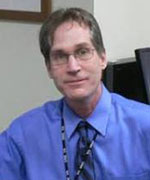 Stephen Chermack, PhD
Stephen Chermack, PhD
Stephen Chermack, PhD, an HSR&D investigator with the Center for Clinical Management Research at the VA Ann Arbor Healthcare System, recently died of pancreatic cancer.
Dr. Chermack had been on medical leave since his diagnosis in November 2015, yet continued his research work via contributions to several accepted manuscripts for various journals. Several of those publications were associated with his five-year HSR&D-funded study, “Impact of Interventions to Reduce Violence and Substance Abuse among VA Patients”.
Dr. Chermack was the Chief of the Mental Health Service at the VA Ann Arbor Healthcare System and a Professor in the Department of Psychiatry at the University of Michigan Medical School. His research interests included substance use screening and brief interventions in medical care settings; developing violence prevention interventions for individuals with substance use disorders; treatment interventions integrating motivational interviewing and Cognitive Behavioral Therapy (CBT); and mental health and substance abuse health services utilization, treatment engagement, and outcomes.
Dr. Chermack underwent chemotherapy for several years, and he worked closely with his oncologist, Vaibhav Sahai, MBBS, MS, to help better understand his unusual long-term success. According to Sahai, Chermack had “broken the mold”, noting that, “fewer than 10 percent of patients with pancreatic cancer have a genetic mutation that responds well to targeted treatment in clinical trials.” Chermack underwent genomic analysis to determine whether his cancer was a candidate for targeted treatment, and donated some of his tumor tissue and blood to help Sahai better understand his positive response to long-term chemotherapy.
According to the American Cancer Society, while pancreatic cancer accounts for only three percent of all cancers in the United States, it is projected to be the second most common cause of cancer related deaths by 2020. Approximately 55,440 people were diagnosed with it in 2018, and an estimated 44,330 will die from it this year.
Dr. Chermack was an active musician, and focused much of his energies on creating a musical legacy for his family. He was widely admired by his colleagues within HSR&D and the University of Michigan communities and beyond, and will be greatly missed.